Kaoru likes Ritsuko, but Ritsuko likes Sentaro, who likes Yurika, but it seems like she’s only interested in Brother Jun. Oh boy. I hate love polygons. I really hate the way no one talks. Characters will just stew with their feelings. They stew until things boil over and friendships are destroyed (or irrevocably altered). Meanwhile, the audience can only sit there and smack themselves in the head.
This ain’t a review; I’ve never ever claimed to be a critic. I just blog my thoughts so it’s really irrelevant to me how realistic the characters are acting. I totally get that teenagers are dumb. It’s hard, however, to watch characters–characters you thought you liked–anguish over nonsense because they can’t just communicate their feelings. I just hate love polygons. Sure, it adds depth to the character relationships, but this is not the depth I’m looking for.
But I guess I have to take my hat off to Kaoru. He’s the only character mentioned above to actually put his feelings out there in the open by confessing to Ritsuko. Maybe Brother Jun’s too cool for school and he’ll sweep Yurika off her feet in later episodes, but for the time being, only Kaoru has said anything about his feelings to the person he likes. He even planted one on Ritsuko’s mouth… only to have her run away in tears (kids, man…). Everyone else devolved into the same blushing, wimpering mass that you almost forget that they were distinct characters with distinct personalities.
It’s weird to say, but everyone else should be more like Kaoru in this case. Put your cards all out on the table and let the chips fall what they may. And if you lose, well shit, it’s just a high school crush.
My tone is getting a little too harsh for a show I still (for the most part) enjoy, so enough about the love affairs of teenagers. My main reason for watching this show is to see how jazz is weaved into the story. Even so, the most interesting bit of development in the past two episode was the revelation that Sentaro is half-American, half-Japanese. Sakamichi no Apollon‘s pretty mixed in its own ways as well.
The characters have a keen interest in jazz, a genre of music that was unfortunately labeled “coon music” by a racist American in a bar. You can find the ever-looming presence of Christianity and salvation in every episode, but Christianity isn’t treated as some fetish of sexy nuns and dueling exorcists. Sakamichi no Apollon tries to explore these foreign concepts as much as Kaoru’s tries to figure Sentaro out. At first, Sentaro looks like any other meathead school bully, i.e. harsh sounding–discordant. But like jazz, once Kaoru got to know Sentaro, he finds a friend that is both an eclectic mix of thoughtfulness and spontaneity.
And both guys come from troubled childhoods. Both guys had difficulty making friends. Both guys were abandoned by their fathers. So is this the reason that Sentaro has turned the “father which art in heaven?” Will Kaoru find salvation in the same embrace of the Lord? I’m not a Christian (or remotely religious), but sin and redemption fascinate me. The last time I wrote about Sakamichi no Apollon, I hinted that I would compare the anime to Haibane Renmei. Unfortunately, it’s still a bit too early for that, I think, but I do want to make a quick observation on Sentaro’s behavior.
Other than his friends, everyone at school thinks that Sentaro’s a hoodlum. Guys who have never even met Sentaro will cower due to his (undeserved or not) reputation alone (see: the end of the second episode). We know that Sentaro fought a lot as a kid, but you don’t earn such a reputation from such a young age. Sentaro likely fought and fought up until recently to maintain the nasty rumors people say about him. Something then changed and he’s stopped ever since. I’m very interested in finding out what changed, but for the time being, it’s also fascinating to see how Sentaro never ever engages in other people’s discussion of him.
People will bring up the fact that Sentaro’s scary, but he ignores it. He doesn’t even address it. He’ll still fight if he needs to defend his friends, but Sentaro’s usually all smiles nowadays. And, at first glance, we might be quick to say that Sentaro’s just running from his past, but this is where I wanted to draw a connection to Haibane Renmei. There are two sides to every person: one’s facticity and one’s transcendent self. In other words, your history and your free will, respectively. The problem with redemption is how the former often tarnishes the latter. Take Sentaro, for instance: he used to get into fights (or possibly worse), but we see him now as a totally great guy. Still, others, i.e. his classmates, can’t help but see the thug who used to beat them up. Can you ever attain redemption if others won’t allow you to escape your past?

Glie
In Haibane Renmei, everyone loses their memory of their past self when they enter the world of Glie. Why? Imagine yourself as the sinner who is now totally repentant. Are you a good person? Now, imagine that you are in Glie and ask yourself the same question. Essentially, Glie allows its inhabitants to free themselves from the trappings of their facticity. A person doesn’t have to worry about his or her past deeds; he or she can just start being a good person and living a good life.
In a way, therefore, you could say that Sentaro is forcibly ignoring his past so that he can just start being a good person. When others say bad things about him, he doesn’t engage them. But look at it in a different way. Sure, there are no mystical powers at work to induce amnesia on Sentaro, but look inward: aren’t we like the inhabitants of Glie. When we first met the guy in the very first episode, we knew nothing of him. We only saw his free spirit, his willingness to befriend Kaoru, etc. So when others say negative things about Sentaro, it’s not that we don’t believe it, but we are quick to affirm Sentaro’s transcendent self, i.e. “Yeah, but he’s a good guy now–he wouldn’t hurt anyone without reason.” It’s as though this is the best way to get the audience past its preconceptions of people like Sentaro, i.e. people who are of mixed blood, people who are physically unlike one of us, people who might not share our religion. etc.
Anyway, I’ve rambled on long enough. Sorry for the lengthy hiatus. Hopefully, I can get back to updating at a steady pace.
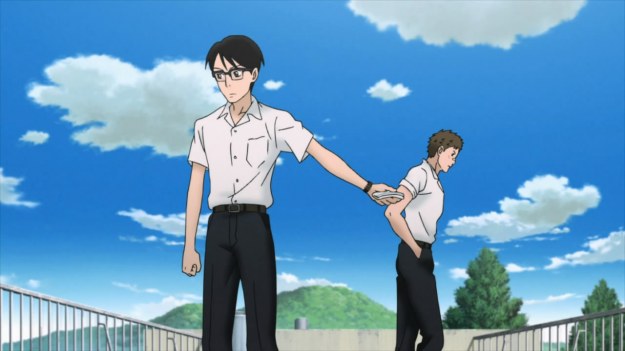
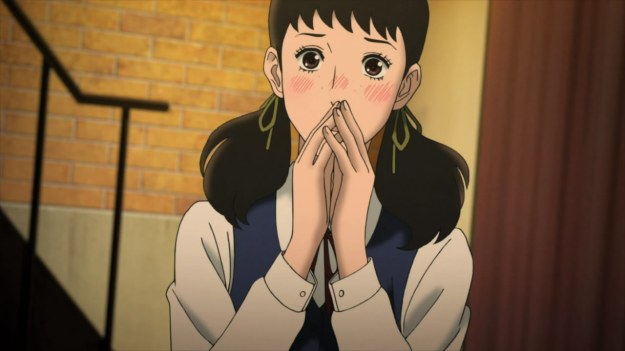
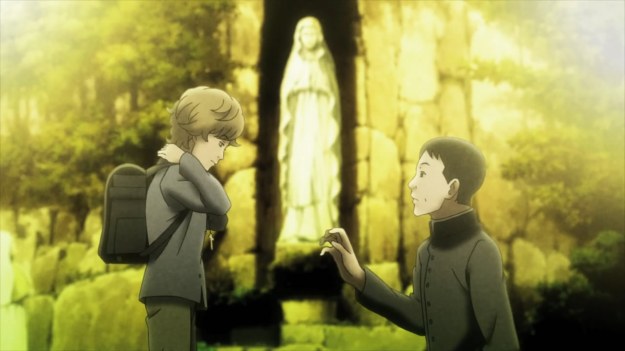
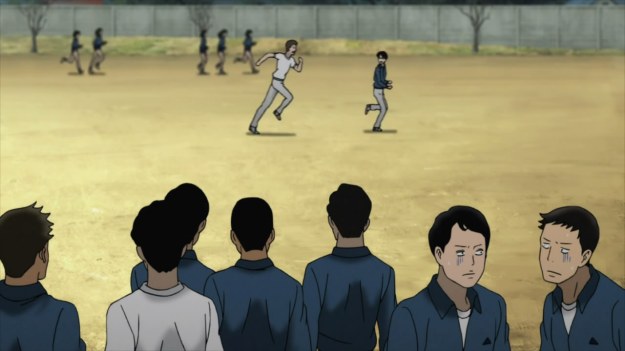
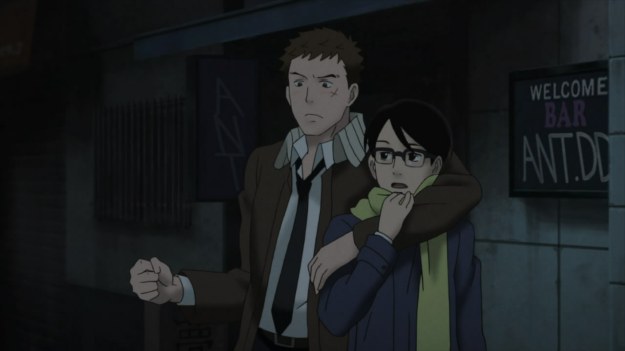
Dem love polygons.
Ano Natsu de Matteru from Winter 2012 season had a similarly shaped love polygon, but the main character/pairing was on the other side of the diagram (a.k.a. they were boring as hell) and the romance was at a higher focus than anything else. These kinds of relationship dynamics involve a rather convoluted game of “He said She said” in which either you get a confrontation between pairings or you stir the pot by having them continue to friendzone themselves and then deflect their feelings to farther parts of the polygon, which then complicates the confrontation process and the friendzoning continues and seemingly the only way to fix that is to consult the third party once again ohdeargodwhy. That’s the only similarity between the two, by the way; Ano Natsu proved to be a nice and enjoyable ball of fluff until it hastily remembered that it had an “ALIENS.” subplot in the penultimate episode.
Shifting towards the discussion at hand, I wondered exactly why Sentaro was so tall and buff compared to his peers given that he only recently turned sixteen. And then the anime pretty much said “That’s because he’s half-American” and everything totally made sense. I was kind of surprised that racism wasn’t really touched upon until the 4th episode, given that this is a period when WWII is still rather fresh in the minds of gaijin and nipponjin alike.
I missed your writing. Don’t leave for a good while this time. :V
I didn’t watch Ano Natsu, so unfortunately, I can’t really comment on its tangled love affairs compares to Sakamichi.
Being of mixed blood is tough now in Japan. I can only imagine what it’s like during the time period that Sakamichi takes place. Here’s a story I heard from another:
This is a secondhand account so I’d take the info with a grain of salt, but yeah….
Reminds me of how some stories/games in the fantasy genre treat half-breeds the same way, especially if racism is a theme, as an obvious symbol of racism in real life. Neither race desires them because they hold traits from the other, and parents are torn between the unconditional love they’re supposed to give to their child and the crippling shame associated with being the parent of something society disapproves of. Shame especially, given that this is Japan we are talking about.
It’s interesting that, if Sentaro does indeed seek redemption, he really means to challenge not only his delinquent image but also the universal stigma of being born differently from others. He made a rather sharp personality change from a passive, meek boy to a thorny, socially elusive delinquent when his grandmother died in order to cope with the continued harassment throughout his school life. Maybe this is why he never found the classroom to be a welcoming place and preferred the roof instead, not unlike how Kaoru first started out.
Though I guess that development will take the back seat in favor of resolving the RABU NO PORYGON.
It’s a little tricky to see where Sakamichi wants to go with the whole issue. Sentaro says it himself that it was more obvious that he is of mixed blood in his younger days (boy, this sentence has awkward phrasing). So how many people at school, other than Ritsuko and (now) Kaoru, actually knows or remembers that Sentaro is half-American? Will it actually come up again? In any case, there’s also the danger that the love stuff will end up overshadowing the more… I dunno… interesting parts about the show (in my opinion).
Slightly off-topic, I’ve been trying to find an anime to write about after giving up halfway through a post on the last few Kuroko’s Basketball post (I figure nobody wants me to get into basketball strategy and jargon). Ah, maybe I’ll just watch the latest Zetman episodes.
Sankarea still has those daddy issues to follow, even if it means slogging through its ecchi romcom tendencies.
Tsuritama is still all over the place in terms of plot, but it might serve as decent comparison material to Sakamichi given the initial similarities.
Nazo no Kanojo X seems to have abandoned its sexual imagery in favor of doing some sort of “Fetish(es) of the Week” with the drool bond a.k.a. watch Tsubaki react to the next crazy thing that Urabe does.
Really, there’s a lot of interesting stuff to comment on this season but I think it’s not necessarily ripe for actual analysis. There’s still E7 AO, Jormungand, Hyouka, and the others I’ve already mentioned if you at least want to have a last say before you drop them for good. Also, you shouldn’t really worry about what readers find interesting and just write what you want, like you say you do. It’s gonna take a while for people to figure out that you’re writing again, anyway. :U
Well, it’s not that simple. Obviously, I shouldn’t alter my opinions to appeal to what everybody wants to hear, but at the same time, nobody wants to talk to a wall. If I write a post and nobody comments (positively or negatively), I’m essentially talking to a wall, even if you say, “It’s gonna take a while for people to figure out that you’re writing again, anyway.” I just had a feeling nobody wanted to read “Well, what Kuroko’s opponent should have done to defeat such a flimsy gimmick as misdirection is….”
“I missed your writing. Don’t leave for a good while this time. :V”
As far as the fasticity and tanscendent self go, is that just in regards to Haibane Renmei, character analysis, or are you claiming that to be a real life dichotomy?
I have mixed feelings about how ever-present love polygons are in high school stories. On the one hand, I am incredibly sick of them for all the very good reasons you give. On the other hand, to be fair, some of the most memorable parts of my high school days were definitely romance related, specifically love polygon related. Geez though, high school is such a turbulent, formative time for many of us. It’s not like there aren’t plenty of other good sources of drama to be drawn from.
I very much like your comparison between Glie and the position the viewer is in coming into the show. Haven’t really got anything to add, but I thought it was an interesting point.
Also, in regards to “Well, what Kuroko’s opponent should have done to defeat such a flimsy gimmick as misdirection is….” I, personally, would find that pretty interesting. It’s nice to see shows deconstructed from a technical standpoint.
Just Haibane Renmei. I think human beings are a little more complicated in real life.
Hey, I ain’t doubting the realism. High school romance is just one of my pet peeves. There’s little in the world that irks me more than stories elevating high school romance into something life-shattering when it is ultimately so inconsequential. Is this fair? Maybe not, but we all have our own preferences.
Kuroko’s Basketball breaks almost all conventions of basketball, it doesn’t even share any semblance.
Oh good, I was a little worried there for a moment. It’s certainly an apt dichotomy in consideration of the themes of Haibane Renmei.
Oh, absolutely agreed. As I said, I’m still sick and tired of it, and it gets a disproportionate amount of coverage, particularly in anime.
>Kuroko’s Basketball breaks almost all conventions of basketball
Apparently defending is too boring for shonen sports…
>Something then changed and he’s stopped ever since.
I’m not entirely sure he has changed much though. Anime seems to be full of misunderstood delinquents with hearts of gold (they feed stray cats or whatever), who don’t go out of there way to pick fights but because of their looks always end up finding them. Jazz is clearly his outlet and in Kaoru he’s found an ally, but I don’t know if his outer persona has changed from his earlier days.
I think the Christianity aspect might have something to do with the setting. I’ve read that Nagasaki was historically the stronghold for Catholicism in Japan because it’s where the missionaries entered. (Even when Christianity went underground due to persecution.)
So, I saw you ask on the sidebar if you have readers left. Yes, yes you do.
Hmmmm, duly noted.
I still check this every day / other day just so you know. I guess I don’t say much ’cause I haven’t seen some of the stuff that’s actually caught your interest. No sense in commenting if I can’t properly comment.
What do you watch, then? Not being mean. Just curious. What do my readers actually watch?
In other news, I’m planning on doing a big, rambling post soon about everything and nothing. I probably shouldn’t have mentioned that… now that I have, I probably won’t get around to it.
I’m not sure all of which shows I started, stopped and dropped since you last were active. Mostly I’ve been playing games lately. This past season I think I got either almost or completely through Rinne no Lagrange (I think I’m 2 eps away from done), Acchi Kochi, got to Episode 7 of Jourmungand (It was interesting, but I still had that knee-jerk reflex of wondering why and I couldn’t ever rationalize why I’d continue), got to the last episode of Inu x Boku SS (I think I kept watching just to see what it was turning into, which I guess was a little different than I expected. Story was basically done at that point), and just recently finished Sankarea, which I can honestly say I liked, but I do hope it’s over. I haven’t read the manga for that or anything, but I feel like they picked a good place to stop because if they continued, it could turn really generic really fast.
Well, summer shows just came out. Which of those do you find interesting?
I’ll leave a response on the post you recently made about them. Short answer as far as the ones that have already had a first episode occur, Jinrui wa Suitai Shimashita (the one about the intermediary between faeries and humans), was strange enough to keep me watching, Campione had some breakneck pacing that happened not to catch my interest (as you described, it was one of those shows that thrives off of the terms it creates for itself…), and Arcana Famiglia reminds me of how little I like harems, male or female. It didn’t try too much to completely sell itself on that straight from the beginning, thankfully, but the main problem I have is that it seems like no matter who the target is, whether they make him or her able to fight or not, always ends up relying on everyone else or not even a character enough to be memorable apart from everyone else.